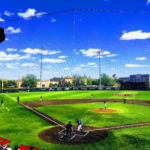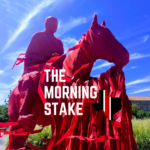 Getting your ass kicked by the Supreme Court can me a 6-3 decision, but when it goes 9-0, it’s an ass-kicking and yesterday, the NCAA got their ass kicked. The case that the Supreme Court ruled on was actually a relatively narrow ruling in the NCAA vs. Alston, where the court said that student-athletes can receive additional educational compensation, but that’s not all. The reason why this was a tail-whipping is that the NCAA vs. the Board of Regents of the University of Oklahoma had been what the NCAA had relied upon:
Getting your ass kicked by the Supreme Court can me a 6-3 decision, but when it goes 9-0, it’s an ass-kicking and yesterday, the NCAA got their ass kicked. The case that the Supreme Court ruled on was actually a relatively narrow ruling in the NCAA vs. Alston, where the court said that student-athletes can receive additional educational compensation, but that’s not all. The reason why this was a tail-whipping is that the NCAA vs. the Board of Regents of the University of Oklahoma had been what the NCAA had relied upon:
As the Supreme Court explained in NCAA v. Board of Regents of the University of Oklahoma (1984), “horizontal price fixing and output limitation are ordinarily condemned as a matter of law under an ‘illegal per se’ approach because the probability that these practices are anticompetitive is so high.” When competitors collude with each other to depress wages, the courts typically come down upon those employers with a hammer.
But the Board of Regents decision also suggests that federal antitrust law does not always apply with its full force toward sports leagues.
Such leagues are known as “joint ventures” by antitrust lawyers. The very nature of team sports is that multiple teams must agree to compete together under a common set of rules. They must agree on when to schedule games and where those games will take place. For these reasons, the courts typically allow sports teams to engage in some degree of collusion with each other — and to form umbrella organizations such as the NCAA, which set rules for many teams — because competitive sports cannot exist without some amount of mutual agreement.
All of that has largely been thrown out the window. Without really studying both cases, I’m guessing that the Board of Regents is no longer precedent and has likely been watered down significantly.
“The bottom line is that the NCAA and its member colleges are suppressing the pay of student athletes who collectively generate billions of dollars in revenues for colleges every year,” Justice Brett Kavanaugh wrote in the 9-0 decision. “Those enormous sums of money flow to seemingly everyone except the student athletes. College presidents, athletic directors, coaches, conference commissioners, and NCAA executives take in six- and seven-figure salaries. Colleges build lavish new facilities. But the student athletes who generate the revenues, many of whom are African American and from lower-income backgrounds, end up with little or nothing …
“To be sure, the NCAA and its member colleges maintain important traditions that have become part of the fabric of America,” Kavanaugh continued. “… But those traditions alone cannot justify the NCAA’s decision to build a massive money-raising enterprise on the backs of student athletes who are not fairly compensated.
“Nowhere else in America can businesses get away with agreeing not to pay their workers a fair market rate on the theory that their product is defined by not paying their workers a fair market rate,” Kavanaugh wrote. “And under ordinary principles of antitrust law, it is not evident why college sports should be any different. The NCAA is not above the law.”
And if you think that Mark Emmert and the NCAA are done fighting, well, you’re wrong:
In an interview with USA TODAY Sports, NCAA President Mark Emmert, NCAA general counsel Scott Bearby and outside lawyer Jeffrey Mishkin said little weight should be given to what Kavanaugh wrote.
“The notable thing is that eight other justices did not agree with that and wouldn’t sign on to it,” Mishkin said. “So I don’t think that you can make very much of that concurrence. It’s his own view, and he’s writing for himself. So, I think that’s just not at all central to what’s been decided today.”
The NCAA’s attorney is maybe just putting on a good face, but to say that the other justices don’t agree with Kavanaugh seems like a reach at best and that to think that the house of cards they’ve built isn’t going to crumble sooner than later seems like a reach. The last linked article confirms that the NCAA spent $33 million in attorney fees and costs and an additional $208 million in damages. For Emmert and the NCAA, it appears that the grift will continue.
 I know what you’re already saying. The NCAA is about to change and basically become professional and yes you are right. As Kavanaugh’s concurring opinion stated, the door is open and free market and paying people for the work that they’ve doing is something that’s, well, completely American.
I know what you’re already saying. The NCAA is about to change and basically become professional and yes you are right. As Kavanaugh’s concurring opinion stated, the door is open and free market and paying people for the work that they’ve doing is something that’s, well, completely American.
The NCAA will not give this bit up without a fight even though the idea that they’ll somehow create a foothold to continue to exist on a level that they’ve previously operated would seem slim. The attorneys will win and more money will be spent. For those of you worried that this will change the dynamics of college athletics, you are probably correct. That seems inevitable. The question is who makes the money. And the Alabama’s and the Duke’s are almost always going to get the best players and what you sell to players is that the program that plays you is the best program for you. Not every can commit to Alabama or Duke, and then it becomes a development situation, which you hope your team excels in.









